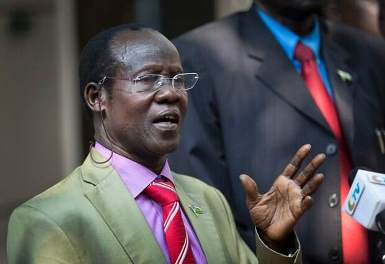VP Igga, Sudanese officials discuss economy, borders
June 6, 2022 (JUBA) – South Sudan’s Vice President, James Wani Igga held bi-lateral talks with Sudanese government officials focusing on economic as well as border relations during his recent visit to the capital, Khartoum.
Igga, who chairs the economic cluster, was in Khartoum on a two-day visit.
The senior official said he delivered President Salva Kiir’s message to the head of Sudan’s Sovereign Council, General Abdel Fattah Al-Burhan.
He described the visit to Khartoum as “successful” and praised the Sudanese authorities for the “warm” reception as we “frank” discussions.
“My visit to Khartoum was a successful mission. I delivered a special message of our president to his brother Gen Abdel Fattah Al Burhan which he received with gratitude and assurance of continuous support and cooperation in all areas of mutual cooperation. He was happy I delivered the message. I had frank and honest discussions on a wide range of issues with other Sudanese leaders”, Igga said Saturday.
The South Sudanese Vice President said he briefed Sudanese officials on the progress made in the implementation of the revitalized peace deal.
Also discussed, he said, was Juba’s role in resolving Sudan’s political crisis for the two countries to enjoy peace and harmony.
“I briefed on the progress made in the implementation of the peace agreement. I also discussed with them and explored the role we can play to help them bridge the gaps in their efforts to find a solution to the current political situation in their country. I emphasized this because peace and stability in Sudan mean peace and stability in South Sudan and the region”, stressed Igga.
He lauded the leadership of Sudan’s Sovereign Council for permitting the cross-border resumption, describing as vital in the interest of the countries.
Relations between the two countries were restrained over unfinished the 2005 peace agreement provisions. A host of contentious issues over which the two sides strive to settle include border demarcation, the final status of Abyei, and the presence of armed or non-armed and hostile groups with the objective to change the government in either Sudan or South Sudan as they operate in the territory controlled by the other have been a contentious matter, resulting in the restriction of movement and subsequent border closure.
(ST)

